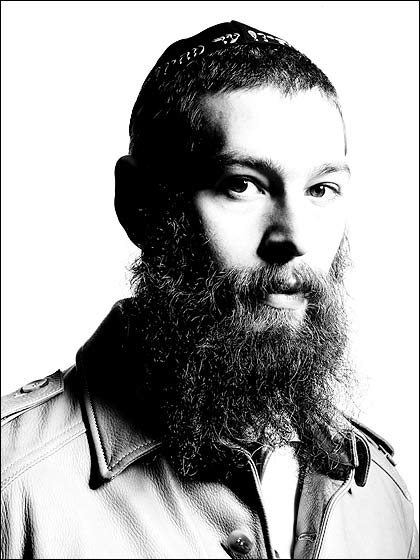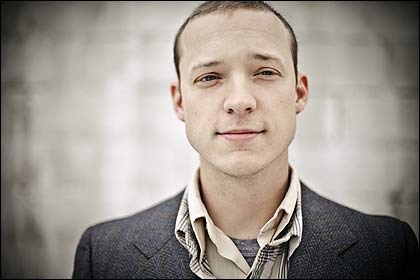
I Don’t Roll on Shabbos
 |
That a former Reconstructionist Jew and hallucinogen-soaked Phish-head festikid turns into one of the premier icons of young Judaism through reggae is proof of how bizarrely coincidental notoriety is in the music industry.
If you knew nothing of Matisyahu but somehow happened upon his live show, the thought “Dude, there’s a rabbi on stage” might cross your mind. And you won’t catch him gigging on a Friday night. That’s not how he gets down — Matis don’t roll on Shabbos.
Though not a rabbi, Matiyahu’s full-on Hasidic Judaism is part of what makes him the most interesting reggae performer alive. The hat, the hair, the beard, the chazzan-style singing that is traditional of his religion: All would seem, at best, subversive were Matisyahu not as astoundingly talented — no, multitalented — as he is. He is no mere novelty in the name of ticket sales. Find a reggae singer who sounds sort of like Eek-a-Mouse mixed with Barrington Levy, who can beatbox like Rahzel, scat like a jazz catman and freestyle like an underground hip hop MC, this is what listeners discovered when they stumbled onto Matisyahu several years ago. Now, in the custom of his earlier jamband influences, Matisyahu has begun to release live albums — the third of which, Live at Stubbs Vol. 2, debuted in February and is widely considered his best yet (Live at Stubbs Vol. 1 is better).
Conscious of himself as a cultural figurehead for Jewish youth, Matisyahu takes to the stage bridging gaps among several worlds, some of which (like Hassidism and reggae) have never before been bridged, and some of which (such as the identity struggle between race and culture and nationalism for American Jews) are ever-changing. He remains in the big leagues of the American record labels (Sony BMG, JDub, Epic) and music scene, as both an oddity and a staple the likes of which has never before been seen.
Matisyahu plays 7 pm Sunday, July 31, at WOW Hall; $25 adv., $28 door.
— Dante Zuñiga-West
Cello, Alive
 |
Ben Sollee makes chamber-pop or baroque-folk that is smart, quirky and charming. In 2007, NPR’s Morning Edition named Sollee one of the “Top Ten Unknown Artists of the Year,” and in 2008 the network described Sollee’s debut album Learning to Bend as “an inspired collection of acoustic, folk and jazz-flavored songs, filled with hope and the earnest belief that the world is good.”
Since then Sollee has stayed busy touring with the Vienna Teng Trio and collaborating with fellow Kentuckian Daniel Martin Moore on the album Dear Companion, produced by Jim James of My Morning Jacket. James says of Sollee’s distinctively percussive approach to the cello: “I never expect to see that cello in one piece after Ben gets done playing it. He bows and beats and works it over with a passionate fury rarely seen. Don’t get me wrong — he can play it and hold his own with the most schooled and delicate scholars out there, but more importantly, Ben makes it live.”
Sollee is also known for his social consciousness and political activism, working with regional non-profits like Appalachian Voices and Kentuckians for the Commonwealth, to help preserve his ancestral Appalachia. In 2010, Ben and his band toured the country not in the comfort of a bus or a plane but by bicycle, hauling all their gear along with them (including that cello). Sollee says that this allowed the musicians to accomplish goals of sustainability while also letting them “slow down and experience the rich communities and people that I’ve spent years flying-by and driving past.”
This experience influenced Sollee’s aptly titled 2011 release Inclusions — in both his signature genre bending and themes of relationships and connections (personal, community wide or between artistic mediums such as music, film and dance). “I love this record,” says Sollee. “I love it for all of its meanings, explicit and incidental. In these songs, I can hear the city I grew up in and the people that lived down the street.”
Ben Sollee plays 4:30 pm Saturday, July 30, at Skip’s Records & CD World, n/c; and 9 pm at WOW Hall; $13 adv., $15 door. — William Kennedy
Tea, Art and Industrial Noise
The Art of Glass will host a benefit concert July 29 for local sculptor David P. Miller. Miller, whose work was recently featured in the Eugene Storefront Art Project, has battled brain cancer for the past two years. Proceeds will go toward his medical expenses.
The opener is Samuel F. Harmon, whose gentle, folksy voice seems designed for art gallery benefits. The singer knows how to work both guitar and poetic wail alike — think Bob Dylan singing Iron and Wine — but the sound is refreshingly raw and eerie without being sorrowful and melodramatic.
The second act is Harmon’s opposite — Don Haugen, a performer whose former stage name was Warning Broken Machine. Haugen’s electrical-industrial noise music can be harsh and jarring at times, but the unconventional combinations of whirls and static are always intriguing.
Continuing the industrial theme of the night is “noiz improv” band FRANTIC, a duo consisting of two distortion-loving bassists known as Mr. Random and tHE bOY. Electronic elements aside, FRANTIC offers jazz-like phrasing that shows off the musicians’ well-matched partnership. And they are excited about playing to support Miller. “David has come to FRANTIC shows in the past, and he has been a faithful supporter of the local music and arts scene,” said Mr. Random. “I certainly hope (the event) is successful in raising substantial funds for David.”
A performance piece by artist Peter Herley, also the event’s coordinator, will conclude the evening. Herley will paint onstage accompanied by a live performance from FRANTIC.
Samuel F. Harmon, Don Haugen and FRANTIC play the “Tea Time For David P. Miller” 5:30 pm Friday, July 29, at Art of Glass. — Brit McGinnis